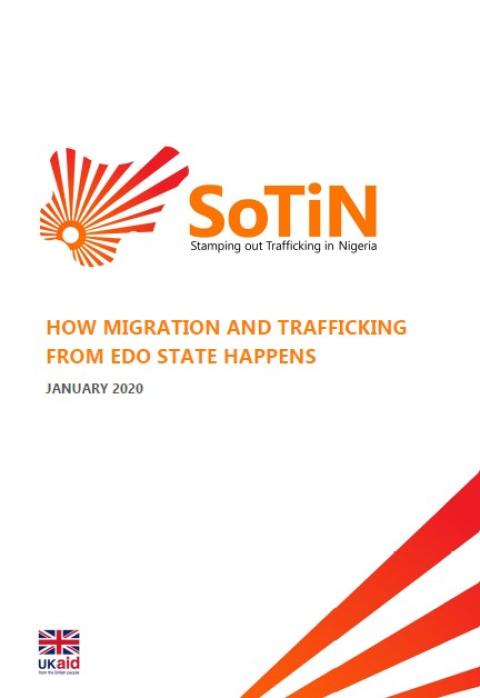- Report
- 9 January 2020
The Stamping out Trafficking in Nigeria reports
- Author: ESubden
- Published by: Stamping Out Trafficking in Nigeria - SoTiN, UK AID

The Stamping out Trafficking in Nigeria (SoTiN) programme, funded by the UK Foreign, Commonwealth and Development Office, was a major part of the UK government’s response to human trafficking and unsafe migration. SoTiN was based in Edo State, in South East Nigeria, which is a hub of human trafficking in the region. The programme, which closed early in the recent FCDO funding review, was structured around four components:
- Strengthening the Edo State Government’s response to human trafficking;
- Supporting law enforcement and victims through the Home Office’s Modern Slavery fund;
- Developing and testing innovative approaches to shift harmful norms and attitudes which support human trafficking and unsafe migration;
- Contributing to the global evidence base on human trafficking via an independent Monitoring, Evaluation and Learning Unit.
The three reports were commissioned as part of the third component – looking at the attitudes, values and social norms which support human trafficking and unsafe migration in Edo State. The reports highlight how norms affect men and women differently and make a number of recommendations for policy makers.
- Drivers and Enablers of Unsafe Migration: a qualitative study among community members and local stakeholders, exploring the attitudes, values and social norms which drive unsafe migration. The research used vignettes to explore empirical and normative expectations, as well as sanctions which support these norms.
- How Migration and Trafficking Happens: a qualitative study of survivors of human trafficking, looking at their experiences, community expectations, and the responses of State agencies;
- Quantitative Profiling of Survivors: a survey of 943 survivors of human trafficking, exploring their experiences, demographic characteristics, and social norms which drive human trafficking.
- Tags:
- Migration, Gender-based violence
- Countries / Regions:
- Nigeria